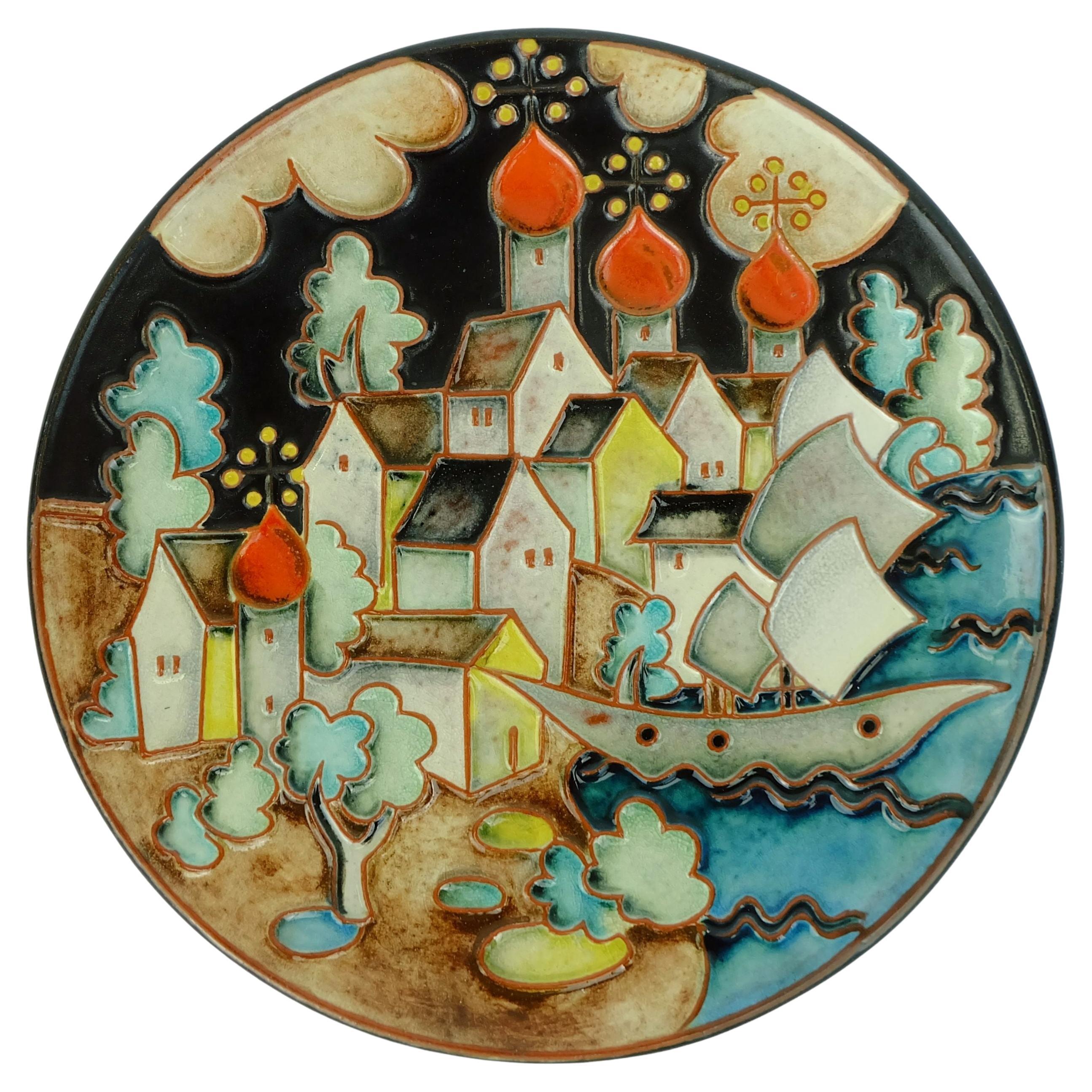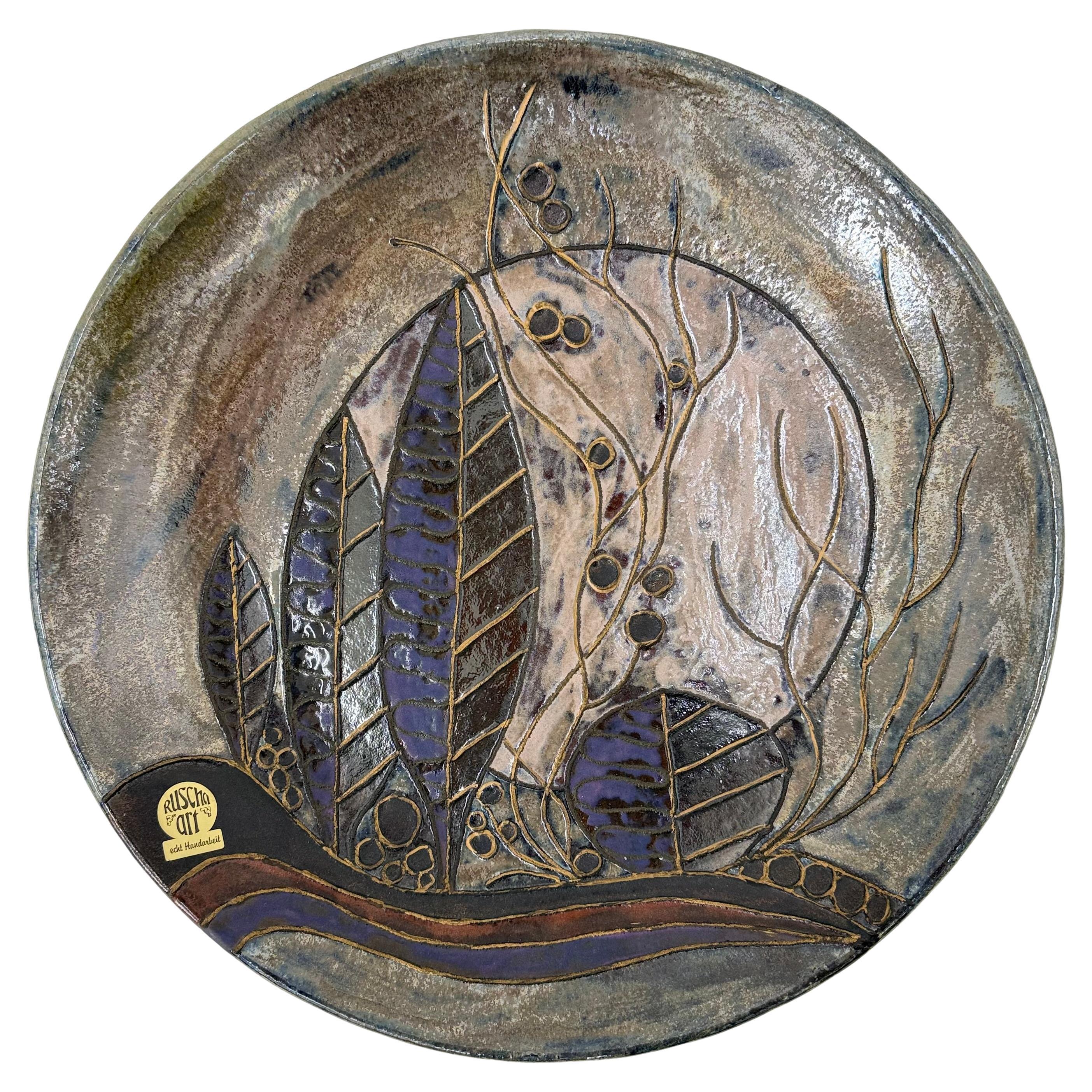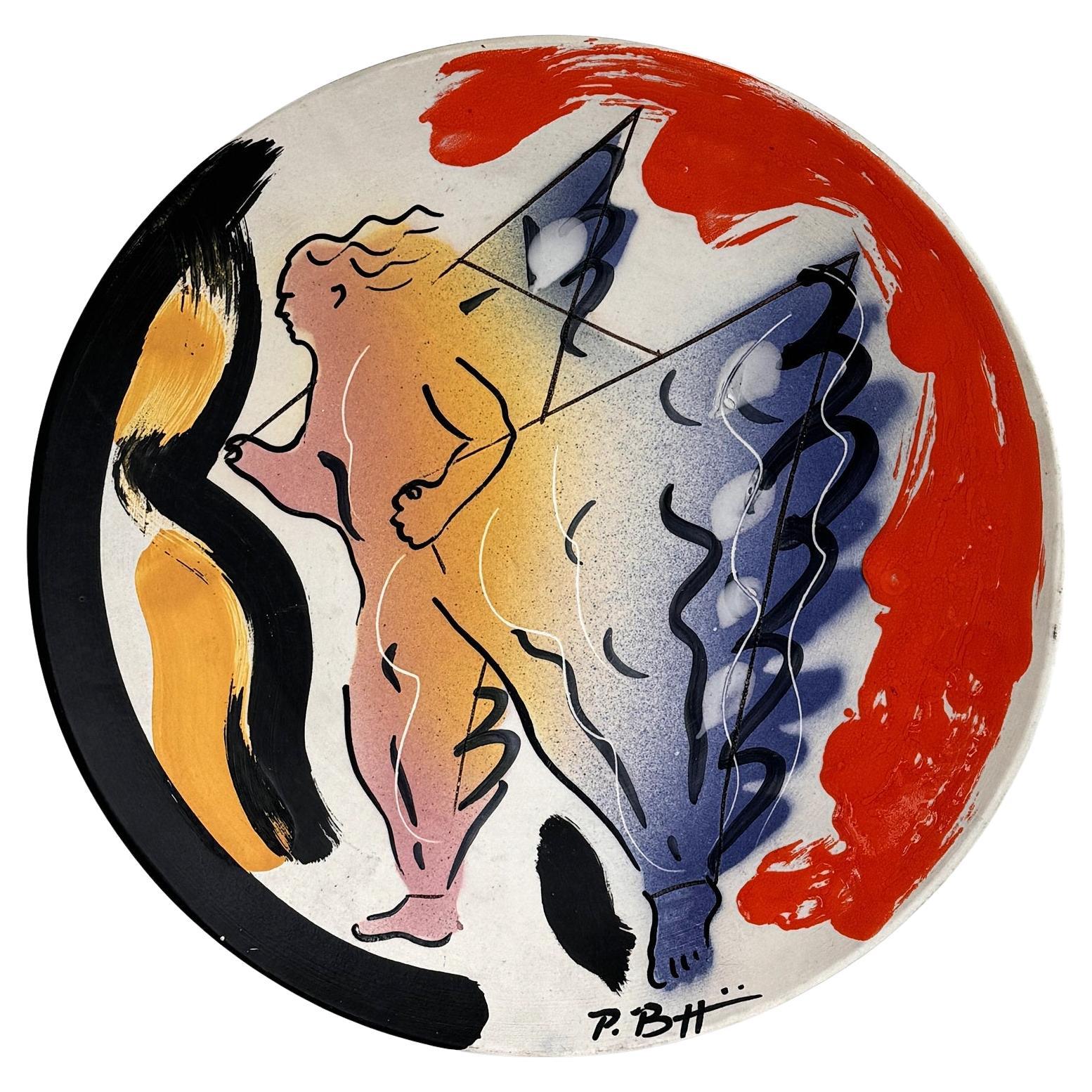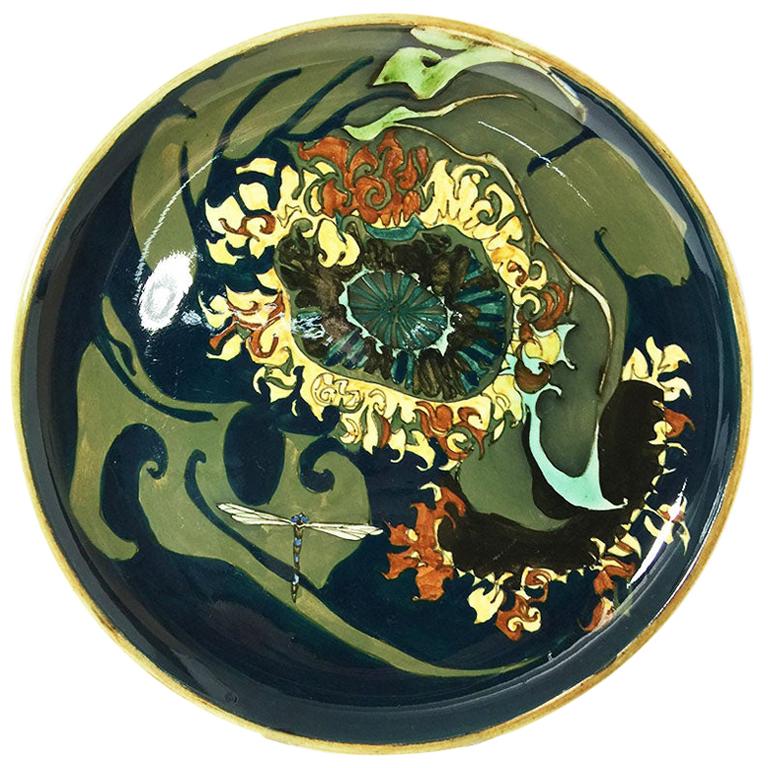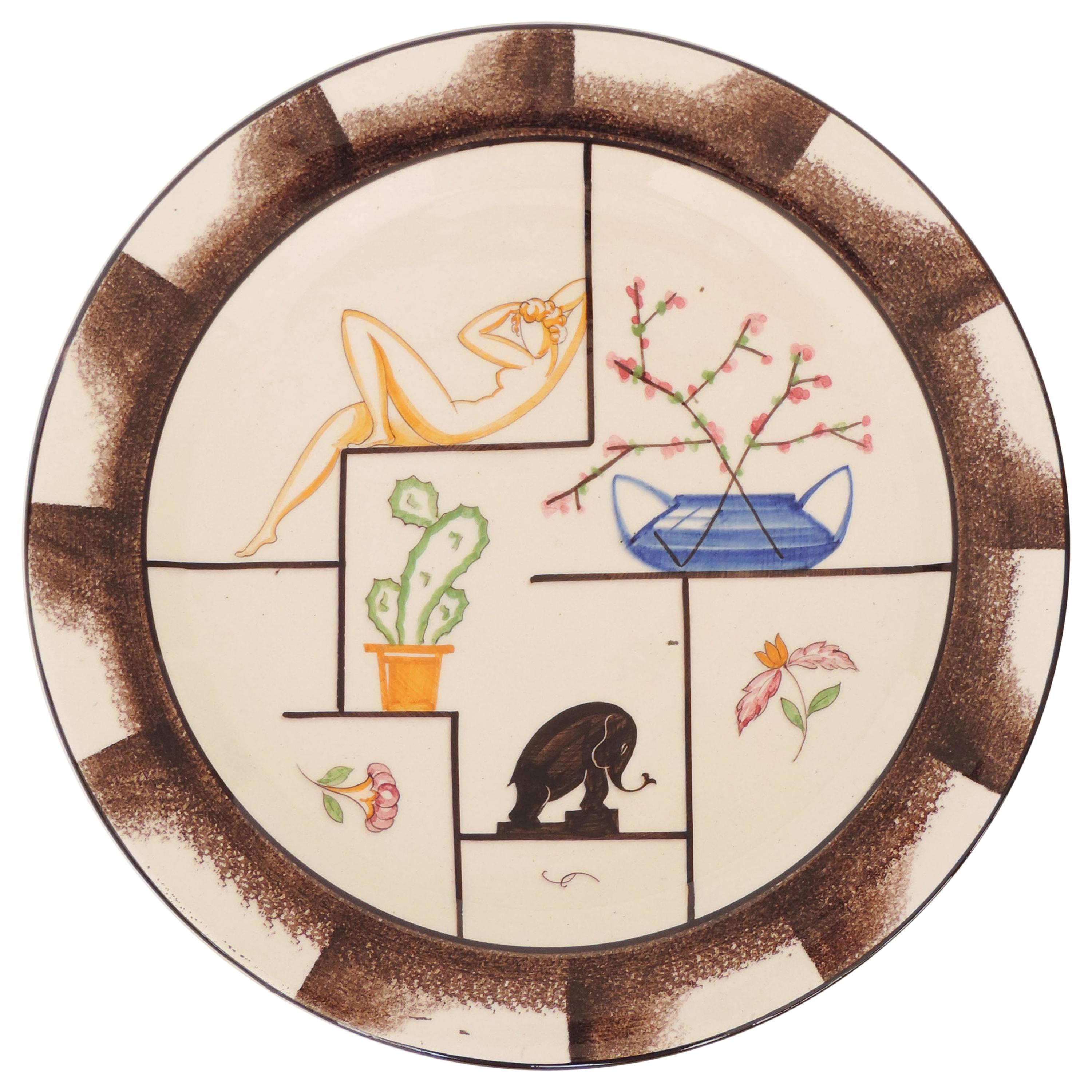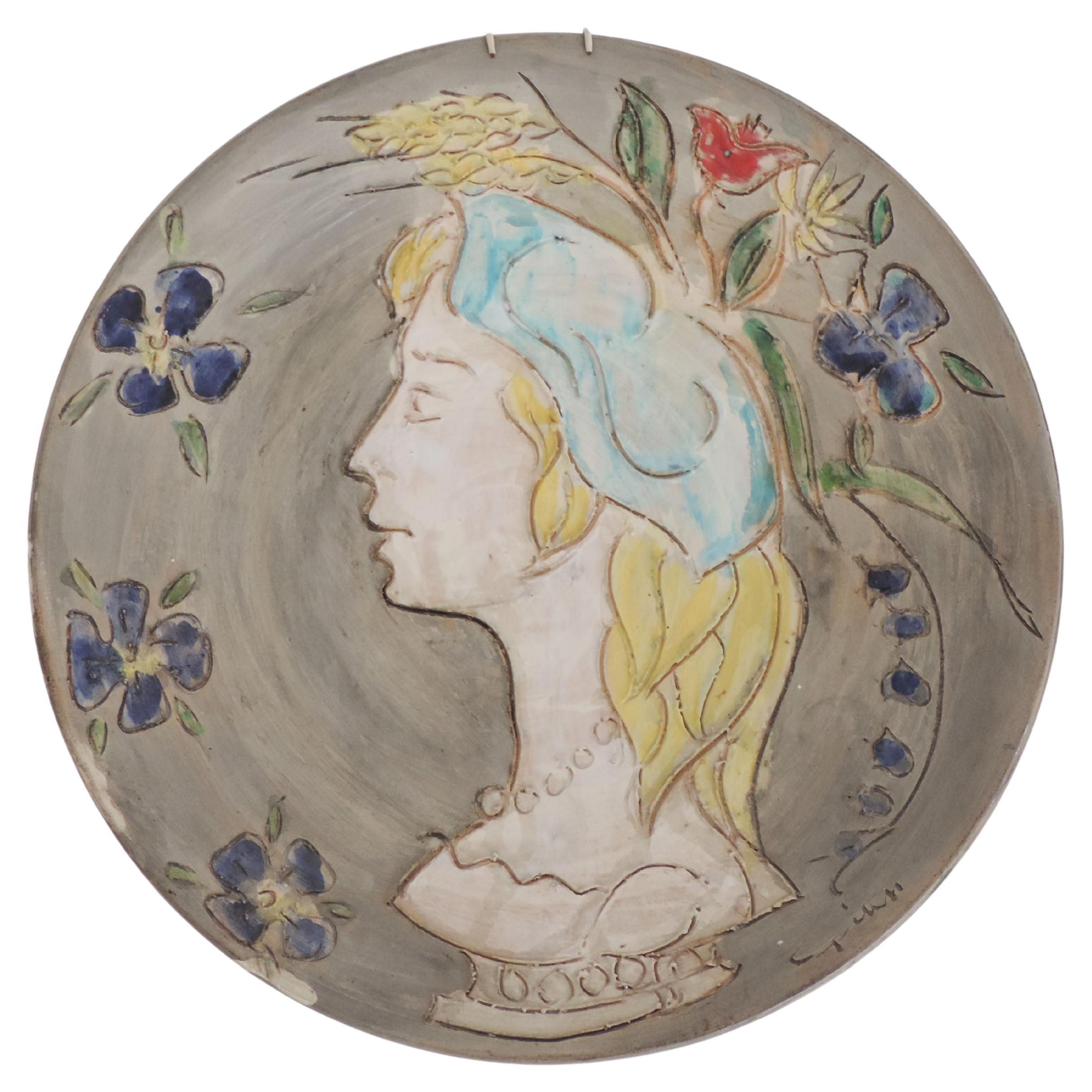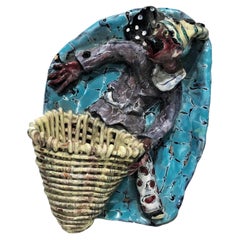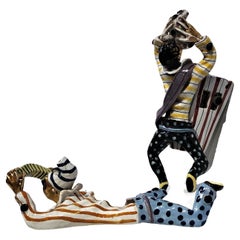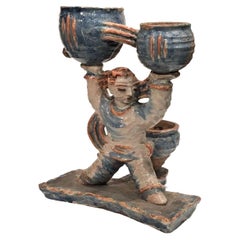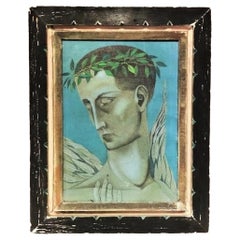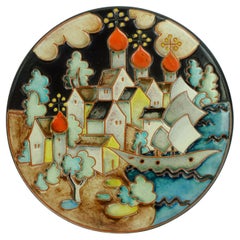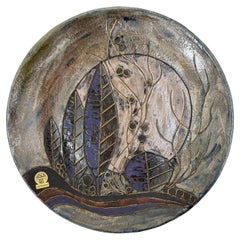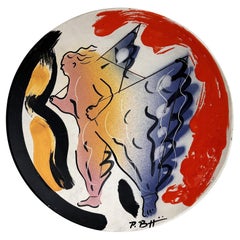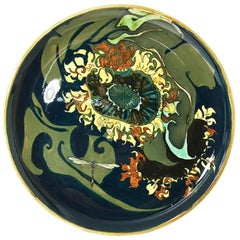Items Similar to Roberto Rosati, Italian Futuristic Art Deco Majolica Wall Plate, ca. 1930s
Want more images or videos?
Request additional images or videos from the seller
1 of 12
Roberto Rosati, Italian Futuristic Art Deco Majolica Wall Plate, ca. 1930s
$7,700
£5,887.06
€6,780.70
CA$10,790.06
A$12,046.09
CHF 6,311.97
MX$147,455.94
NOK 80,162.07
SEK 75,582.65
DKK 50,605.09
Shipping
Retrieving quote...The 1stDibs Promise:
Authenticity Guarantee,
Money-Back Guarantee,
24-Hour Cancellation
About the Item
This large and stunningly beautiful hand-painted futuristic Art-Deco majolica wall plate by famous Italian ceramist, Roberto Rosati depicts a peasant woman in a sunlit field during harvest. Gracefully bending down, with a disobedient lock of hair knocking out from under her kerchief, she cuts off handfuls of wheat with a sickle.
This unique plate possesses several outstanding qualities at once - most unexpected artist's vision, elegant minimalistic composition and discreet decorativeness, exceptional workmanship; and, especially, the absolutely non-trivial color palette of brown, black and white silhouette of a peasant woman against background of gold and semi-opaque pale yellow paints, laid on the majolica surface with bold and precise strokes of a real master.
Attribution
Signed (front center) with stylized monogram “R” and inflorescence of shamrock below; and (back) “RSCVOLA D’ARTE GIROTTAGLIE”.
Dimensions
Diameter: 18.5 inches (46.25 cm)
Height: 18.5 inches (46.25 cm)
Condition
The plate is in good antique condition consistent with age and use. However, a museum-quality restoration is present – as the frontal surface of the plate looks perfect, without any visual restoration traces; the back of the plate shows obvious traces of previously executed restoration, probably done no less than at least 50-60 years ago.
Roberto Rosati (Rome, 1889 – 1949), a native of Rome, was one of the most talented ceramists of his generation, following the futuristic direction in art. In 1925, Roberto Rosati was called by Giuseppe Rodriguez, famous Roman ceramics maker and school owner to teach artistic ceramic painting in his laboratory and the ceramic school, located in Rome at via S. Maria in Cappella, 11; where he taught for several following years. Despite the heavy workload and being constantly surrounded by numerous students, he nevertheless finds time for creation of his own very original works, and participation in exhibitions.
The peculiarity of the Italian art "production" of the interwar years, which is best known, is its comparative liberality against the background of Germany and the USSR. The Futurists were among the first supporters of Benito Mussolini and therefore could work as they wished; rationalist architects close to the international modern movement also received government orders, as well as adherents of metaphysical painting, "Novecento" coexisted with them very well.
In 1937, Roberto Rosati, already a venerable and well-known ceramist by that time, was invited to take the position of director of SCUOLA D'ARTE GROTTAGLIE, founded in 1887. Still existence today, it is now called Istituto d'Arte Grottaglie (via Jacopo della Quercia, 1, 74023 Grottaglie, Puglia, Italy). For centuries, Grottaglie, a small town in the province of Taranto in Puglia, has been the site of flourishing artisanal ceramic production closely linked to the richness of the clay, typical of this region. The art of ceramics in Grottaglie has a very long history, as demonstrated by the magnificent finds displayed in the Ceramics Museum, with its roots stretching back to the Medieval period. Figurine ceramic craft, which was the driving force of life and commerce in Grottaglie for centuries, is represented in the museum by approximately 400 items spanning a time period from the eighth century B.C. to the present day.
The years spent by Roberto Rosati as school director until his death in 1949 fell on a very important historical moment in Italian history - the heyday and further decline of the dictatorial fascist rule of Mussolini; which was also one of the brightest periods in the development and formation of future Italian art after the Renaissance.
For a long time, there was no talk at all about the official style of the regime, and there was always a varied private order. However, it should be remembered that rationalists emphasized their connection with tradition, which was unimaginable for most foreign modernists of those years, and futurism after the First World War changed significantly, changing the "composition of participants" and becoming less radical and ready to create according to the demands of the time. Time called for "return to order" throughout Europe. But it was in Italy that this appeal to tradition, reality, and history acquired distinct features of "construction", which can be compared with postmodern experiments, up to irony, for example, in arts and crafts in general and in ceramics in particular.
But even quite serious artists, such as, Rosati, who claimed a unique sense of taste, form, beauty inherent only to Italians, and reminded of the achievements of the Renaissance masters, eventually created conglomerates, where it is clearly read: the time of the "classics" has irrevocably passed away already in the 1920s.
Everyday Italians, as well as intellectuals referred to the great Italian art of the past, but each time you look at these statues and canvases, one does not leave a feeling of the artificiality of this play of forms, postmodern "modernization" of the classics. And here the perspective is clear further - to post-war, often more lively and honest experiences.
- Creator:Roberto Rosati (Artist)
- Dimensions:Height: 1.5 in (3.81 cm)Diameter: 18.5 in (46.99 cm)
- Style:Futurist (Of the Period)
- Materials and Techniques:
- Place of Origin:
- Period:
- Date of Manufacture:circa 1930
- Condition:Repaired: A museum-quality restoration is present – as the frontal surface looks perfect and without visual traces of repairs; the back shows obvious traces of an old restoration done, probably, no less than at least 50-60 years ago. Wear consistent with age and use. We make our best effort to provide a fair and descriptive condition report. Please examine the photos attentively, as they are an integral part of the description. Send us a message to request more details or discuss price.
- Seller Location:New York, NY
- Reference Number:1stDibs: LU2819326760552
About the Seller
5.0
Vetted Professional Seller
Every seller passes strict standards for authenticity and reliability
Established in 1993
1stDibs seller since 2017
83 sales on 1stDibs
Typical response time: 11 hours
- ShippingRetrieving quote...Shipping from: New York, NY
- Return Policy
Authenticity Guarantee
In the unlikely event there’s an issue with an item’s authenticity, contact us within 1 year for a full refund. DetailsMoney-Back Guarantee
If your item is not as described, is damaged in transit, or does not arrive, contact us within 7 days for a full refund. Details24-Hour Cancellation
You have a 24-hour grace period in which to reconsider your purchase, with no questions asked.Vetted Professional Sellers
Our world-class sellers must adhere to strict standards for service and quality, maintaining the integrity of our listings.Price-Match Guarantee
If you find that a seller listed the same item for a lower price elsewhere, we’ll match it.Trusted Global Delivery
Our best-in-class carrier network provides specialized shipping options worldwide, including custom delivery.More From This Seller
View AllOtello Rosa for San Polo, Italian Modernist Ceramic Wall Sconce, ca. 1950s
Located in New York, NY
Italian Mid-Century Modernism
Otello Rosa for San Polo
Pinocchio Wall Sconce
ca. 1950s
ABOUT
Otello Rosa (Italian, 1920 – 2007) is the author of this stylish Mid-Century Modernist w...
Category
Vintage 1950s Italian Mid-Century Modern Wall Lights and Sconces
Materials
Ceramic
Otello Rosa Italian Mid-Century Modern Ceramic Sconce & Wall Art, ca. 1950s
Located in New York, NY
Mid-Century Modernism
Otello Rosa for San Polo
A Pair of Personages from La Comedia dell’ Arte
Ceramic Wall Sconce & Wall Art
Italy, ca. 1950s
ABOUT
These wonderful ceramic Wal...
Category
Vintage 1950s Italian Mid-Century Modern Wall Lights and Sconces
Materials
Ceramic
Expressionist Ceramic Sculptural Vase Attributed to Vally Wieselthier, c. 1920
By Vally Wieselthier
Located in New York, NY
Although unsigned, this magnificent Austrian expressionist art ceramic sculptural vase with three receptacles is attributed to Vally Wieselthier for Wiener Werkstatte, ca. 1920.
Valerie "Vally" Wieselthier (Austrian-American, 1895 – 1945) was an outstanding ceramic artist. She was born to a Jewish family in Vienna, Austria. Her father, Wilhelm Wieselthier was a lawyer. Valluy attended theWiener Frauenacademie in Vienna from 1912 to 1914 and studied at the Vienna School of Applied Arts with Rosalinda Rothhansl, Kolo Moser, Jodef Hoffmann and Michael Powolny from 1914 to 1920. In addition, she worked as an auxiliary nurse during the First World War.
From 1917 to 1922, she worked for the Wiener Werkstatte. From 1922 to 1927, she ran her own ceramic workshop in cooperation with the Augarten porcelain factory, which was newly founded in 1923, but also with other companies such as Friedrich Goldschider, Gmundner Keramik and Lobmeyr.
Her expressive and humorous porcelain figures attracted attention at the Exposition Internationale des Arts Décoratifs et industriels modern in Paris in 1925 and are considered typical examples of the Art Deco style style. From 1928, the artist increasingly moved her center of life to the United States. She went to the International Exhibition of Ceramic Art in New York City in October 1928. In 1933, she moved to Chicago with Paul Lester Wiener...
Category
Vintage 1920s Austrian Expressionist Vases
Materials
Ceramic
Richard Wilt, Caesar, American Mid-Century Modern O/C Painting, Ca. 1960s
By Richard Wilt
Located in New York, NY
ABOUT ARTIST
Richard Wilt (American, 1915 - 1981) > Chronology and Exhibition History
1915 Born in Tyrone, PA
1981 Died in Ann Arbor, MI
EDUCATION:
1...
Category
Vintage 1960s American Mid-Century Modern Paintings
Materials
Canvas
Japanese Contemporary Grand Pottery Sculpture, Ca. 1980
Located in New York, NY
Japanese Contemporary Grand Pottery Sculpture, Ca. 1980
ABOUT
This absolutely unique late 20th Century pottery sculpture with bamboo-styled formed handles features a wonderful artis...
Category
Vintage 1980s Japanese Japonisme Abstract Sculptures
Materials
Pottery
Zenith Watch Co., Swiss Art Deco Metal Dore and Cloisonne Enamel Clock, 1920s
Located in New York, NY
Zenith SA is a Swiss luxury watchmaker. The company was started in 1865 by Georges Favre-Jacot at the age of 22, in Le Locle in the canton of Neuchâtel. Zenith w...
Category
Vintage 1920s Swiss Art Deco Table Clocks and Desk Clocks
Materials
Metal
$1,080 Sale Price
20% Off
You May Also Like
majolika karlsruhe WALL PLATE gustav heinkel 1930s
By Karlsruher Majolika, Gustav Heinkel
Located in Mannheim, DE
Very beautiful platter designed by Gustav Heinkel for Majolika Karlsruhe in the early 1930s. Majolika Karlsruhe logo on the backside.
Dimensions: Diameter 7 2/3" (19.5 cm), height 3...
Category
Vintage 1930s German Art Deco Decorative Art
Materials
Majolica
Ruscha Handarbeit ceramic wall plate , 1970s Germany
By Ruscha
Located in Delft, NL
Ruscha Handarbeit ceramic wall plate , 1970s Germany
Category
Vintage 1970s German Mid-Century Modern Mounted Objects
Materials
Ceramic
Italian Mid-Century Ceramic Wall Plate Decoration by Paolo Buggiani, 1989
By Bitossi
Located in Morazzone, Varese
Italian Mid-Century Ceramic Wall Plate Decoration by Paolo Buggiani, 1989
Gorgeous wall plate hand-crafted and hand-painted by Paolo Buggiani in 1989 in limited edition.
The plate i...
Category
Vintage 1980s Italian Mid-Century Modern Ceramics
Materials
Ceramic
Rozenburg Earthenware Wall Plate, The Hague, the Netherlands, 1893
By Rozenburg Porcelain
Located in Delft, NL
Rozenburg earthenware wall plate, The Hague, the Netherlands, 1893
Rozenburg earthenware wall plate, with Art Nouveau style floral decor and ...
Category
Antique Late 19th Century Dutch Decorative Art
Materials
Earthenware
Carraresi e Lucchesi, Sesto Fiorentino Italian Art Deco Decorative Plate, 1930s
Located in Milan, IT
Large Carraresi e Lucchesi, Sesto Fiorentino Italian Art Deco decorative plate, 1930s.
Category
Vintage 1930s Italian Art Deco Ceramics
Materials
Ceramic
$2,835 Sale Price
20% Off
Italian Figurative Earthenware Wall Plate, Italy 1950s
By Enrico Ciuti
Located in Milan, IT
Splendid Italian Figurative engraved Earthenware Wall Plate,
Woman bust with flowers on her head
Illegible Signature.
Italy 1950s.
Category
Vintage 1950s Italian Mid-Century Modern Wall-mounted Sculptures
Materials
Earthenware
$3,780 Sale Price
20% Off
More Ways To Browse
Art Deco Plate Germany
Italian Art Deco Painting
Large Ceramic Wall Plates
Medieval Plate
Italian Ceramic Woman
Italian Ceramic Wall Plates
Majolica Art Deco
Talking Plates
Italian Futurist Ceramic
Vintage Wheat Plates
Majolica Figurine
Small Ceramic Statues
Lock Of Hair
Vintage Kerchiefs
Vintage Black Woman Figurine
French Zinc Letters
Micro Mosaic Plaque
Panton Panel
